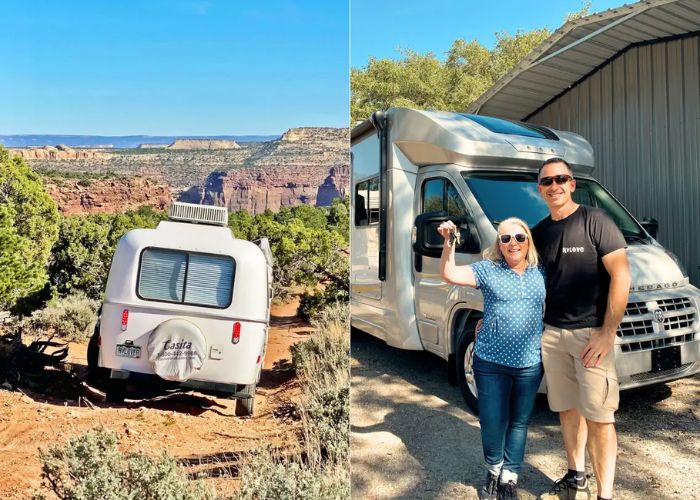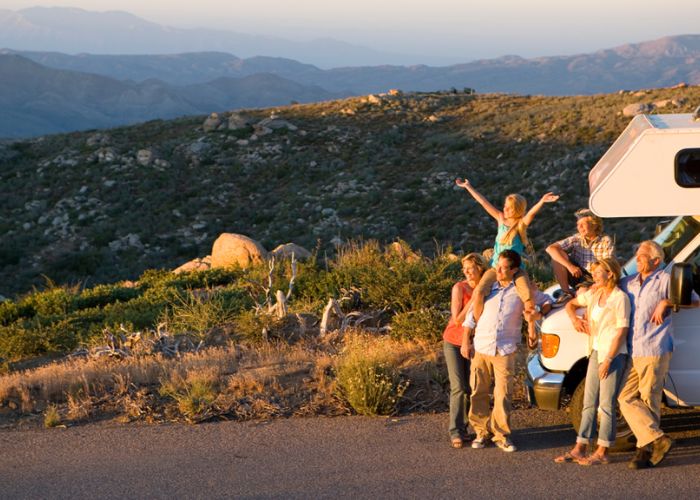As an experienced RV tourist who has driven across the country in my motorhome for over seven years, I’ve learned from my mistakes. You can have a great time traveling and seeing the beauty of America in an RV, but it takes a while to get good at it. It is simple for beginners to get confused, like when they buy the wrong RV or think gas costs less than they do. Read below about “Biggest RV Travel Mistakes Beginners Make?-Avoid Them”.
I’ve learned from my mistakes how to avoid the most common problems first-time RVers have. Some of the biggest mistakes people make when they first start RV traveling, along with my best advice on how to avoid them.
Table of Contents
Not Realistically Assessing Your Vehicle

Getting the wrong RV for your needs is one of the biggest mistakes first-timers make. Too many excited new owners buy huge Class A RVs or fifth wheels without thinking about how well they can drive in everyday life or how much experience they have pulling heavy loads. A 40-foot RV might sound cool, but it can be very hard for new drivers to move, park, and drive.
Before you buy, be honest about the sort of car you already have and how confident you are behind the wheel. If you’ve only ever driven a car or small SUV, you won’t be able to handle a big motorhome. You could start out with a camping van, trailer, or medium Class C RV to get better at what you’re doing. Before making a decision, take a test drive to get used to turning, backing up, and stopping the RV.
Not Budgeting for Additional Costs
When planning a budget for an RV trip, it’s easy to only think about how much the RV will cost to buy and how much gas it will use. But repairs, insurance, park fees, and other costs add up quickly. When I was RVing for the first year, I often found that my money ran out faster than I thought it would.
To cover all the extra costs, I now know to set aside at least 30% more than the cost of my RV and gas. Make a spreadsheet with figures for repairs, insurance, RV club memberships, storage when needed, campground fees (at least $30 to $50 per night), and an emergency fund. Do not forget to include the cost of food, fun, and more fuel for the generator. You can avoid money problems in the middle of your trip by planning ahead.
Overpacking the RV
Every single new RV owner ever said, “We’ll bring everything just in case we need it!” When I first got my RV, I surely stuffed it too full. Having some extra supplies is a good idea, but packing too much makes things bulky and heavy.
When putting things in your RV, be smart and simple. Stick to the things that are on your list of must-haves. Maximizing room means using things that can be used for more than one thing. Don’t bring too much food and clothes unless you’re going to be camping away from the power grid for weeks. When you’re driving, keep in mind that anything moving inside the RV can turn into a dangerous missile. Don’t bring more than you need and will use.
Neglecting Proper RV Maintenance
For first-time RVers who are still getting used to driving a big vehicle, regular maintenance is very important to avoid breakdowns and crashes. But it’s simple to forget about small things when you’re excited about a trip. I ignored small issues like old tires and weak batteries for the first year I had my RV. This caused some scary accidents on the road that could have been avoided with more care.
Now I make sure to take care of any repair issues right away and use a pre-trip checklist to look for problems. Check all of the RV’s systems carefully before you leave, and have a professional look at it twice a year. For things like oil changes, filter replacements, etc., follow the manufacturer’s maintenance plan. You’ll feel better on the road if you take a little time to check everything before you leave.
Not Practicing Driving Skills
Driving a big RV is very different from driving a regular car, even if you’re an expert driver. However, a lot of new drivers wrongly think that their current driving skills will easily translate to the new one. I’ll be honest: I got myself into a few tough RV parking problems early on!
Spend a lot of time practicing backing up, turning, and stopping your RV before your first trip. You can practice making tight turns and backing into spots in empty parking lots. Learn how to line up the RV correctly with cones or marks. Invest in skilled driving lessons if you need to. Gaining control and confidence while driving the RV ahead of time will help you avoid embarrassing situations on the road.
Not Checking to See If Route Is Accessible
Beginners are often too eager to hit the road to do a full study of which routes are accessible for their RV’s size. I will never forget how my RV’s GPS led me down a narrow country road with deep holes on either side. It almost killed me! Now I’m aware that a lot of regular GPS systems and apps don’t actually give RV-friendly directions.
Make sure that your plan allows enough space for bridges, tunnels, low trees, tight turns, and the width of the road. You should call ahead to make sure that RVs can get to highways, roads, and places along your route that have limited access. RV LIFE Trip Wizard and other apps can plan safe routes for your RV based on its size and needs. Checking that you can actually drive your planned route will help you avoid shocks and disasters.
Not Enough Experience with RVs
RVs are complicated because they have a generator, tools, electrical, plumbing, propane, and other systems. However, it’s simple for newcomers to think that everything will work properly without any practice. On my first RV trip, I had trouble getting the generator to work, hooked up the sewer hose wrong, and tripped circuit breakers by mistake.
Learn how to use all of the RV’s tools and appliances before you go on the road. Learn how to use the gas heater, generator, air conditioner, awning, and entertainment system. Check the lines for water, electricity, and propane. Learn how much a tank can hold and how to properly empty and fill it. Having hands-on training ahead of time will keep you from making mistakes when you get to the campsite.
Not Thinking About The Limits Of Your Tow Vehicle
If you’re moving to a bigger trailer or fifth wheel RV, it’s very dangerous if the two don’t match up properly. But it’s easy for first-timers to fall in love with a fancy RV and forget about the tow rating limits. In the early days of RVing, I almost bought an RV that was much bigger than what my car could safely pull.
If you want to know exactly how much you can tow with your tow car, check the manual before you go RV shopping. Don’t just look at the dry weight; also think about the weight with water, propane, groceries, people, and other things on board. Allow an extra 15 to 20 percent of safety below the maximum tow grade. Putting a truck and trailer together wrong can lead to major motor problems, drag, sway, and even crashes. As you upgrade, don’t let your joy get in the way of your safety.
Conclusion
Going on trips in an RV is a lot of fun. By not making these mistakes, you’ll be well on your way to making great moments on the road with less stress and trouble. If you follow my tips, you can make your RV dreams come true without all the hassle. Let me know if you need help with anything else about RVing. Have a great trip and enjoy camping! I hope you like reading “Biggest RV Travel Mistakes Beginners Make?-Avoid Them”.

ILOCANO + TRAVELER + BLOGGER + ENTREPRENEUR
With over 8 years of global travel experience and a Master’s degree in Travel Journalism, our author brings a blend of academic expertise and real-world exploration to ByAJayRo.com. Passionate about discovering unique destinations and sharing insider tips, they provide practical advice and authentic insights to enhance your travel experiences.
Connect with us on social media for the latest travel updates and inspiration:

